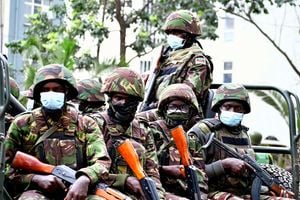Does plan to send 1,000 police officers to Haiti comply with the Constitution?

A man holds a tree branch and marches by burning tires during a protest against insecurity, on August 7, 2023.
On August 1, 2023, the American ambassador to the United Nations, Linda Thomas-Greenfield, said that the United States would put forward a Security Council resolution that will authorise Kenya to lead a multinational police force to help combat gangs in Haiti. That effort seemed to gain real momentum during the recently concluded 78th United General Assembly when President William Ruto implored the UN “to urgently deliver an appropriate framework to facilitate the deployment of Multinational Security Support” in Haiti.
Ruto, and his CS of Foreign Affairs Alfred Mutua, have confirmed several times that Kenya is ready to send 1,000 police officers to Haiti. But does the decision or promise comply with the Constitution? What are the constitutional requirements that must be met before Kenya police can be deployed abroad?
Exercising public power
Let me start with some basic facts. The legitimacy and weight of Ruto’s supplication about Haiti hinges on the fact that he is the President of Kenya. He is recognised by the Constitution and international law as the foremost representative of Kenya on foreign policy issues. Essentially, his pledge to send 1,000 police officers is an exercise of public power. But there is always a starting point in the exercise of public power: the Constitution. This is because Kenya is a constitutional democracy where everyone and every action must align with the constitution, but importantly, must be justified through and justifiable under the constitution.
Historically, constitutions were not elaborate documents because past constitutional theorists and drafters viewed them as documents that articulated broad principles on how a state was organised and governed. But contemporary constitutions are relatively elaborate because societies are identifying more and more issues that are sufficiently important to be regulated. This is one reason that Kenya’s 2010 constitution is comparatively elaborate to those that came before it. But there is a more fundamental reason why Kenya’s constitution is lengthy: the trust deficit that the people have with their leadership. Past experience taught Kenyans that unless political leaders are restrained in their exercise of public power by explicit constitutional provisions, they are just too eager to become the law unto themselves. Hence, in its prophetic wisdom, the 2010 Constitution anticipated that members of the “national forces”, including the police, may be deployed abroad – and so, it spelt out directly the procedural requirements needed to make such deployment constitutional. This is in Article 240(8).
Article 240(8) gives the National Security Council the power to deploy Kenyan forces abroad but only with approval of parliament. The questions that immediately arise are: did the National Security Council consider and decide on the proposal to deploy the police to Haiti or was this Ruto’s unilateral decision? Given the secretive nature of the Council, it may be hard to know whether this was ever considered. But two more fundamental questions remain in assessing the legality of the deployment. The first is obvious and goes to the pith of Article 240(8). Did the National Security Council seek and obtain the approval of Parliament before the President started promising the world that Kenya would deploy 1,000 police officers? This is easy to establish, because Parliament is a House of comprehensive record. Is there a parliamentary record of such request, consideration or approval?
The second question is about the role of the Inspector General of police (IG). The answer to that question starts with Article 245. That Article provides that the IG exercises “independent command” over the National Police Service. The provision goes further to specifically ring fence the independent command role of the IG by noting that no one can give direction to IG in regard to “assignment” of National Police Service.
But what does all this mean?
While the National Security Council may decide to deploy – with approval of parliament – members of the National Police Service for a foreign mission, the starting and end point of that authority remains with the IG, who must be satisfied that there is need and it is prudent for the national police to be deployed abroad. In fact, the National Police Service Act considers deployment of Kenya police abroad to be an assignment with the chain of command still terminating with the IG.
This may sound circuitous but there is constitutional logic to it. One, the constitutional responsibility of maintaining national security falls on the police as an independent entity, not the President or the Executive. Before Kenya police can be committed to foreign service, the IG must determine that such an act will not compromise the ability of national police service to discharge its primary role – that of national security.
Two, having authority over the command of the national police means that the IG is responsible for the well-being, safety of all police officers deployed in Kenya or abroad. The capacity assessment is especially critical when it is an external deployment to deal with law enforcement concerns that Kenya police do not confront daily – like ubiquitous, sophisticated criminal gangs. If the IG hastily agrees to a decision to deploy national police extra-territorially based on the president’s mere asking or other political whims, he would be in dereliction of his constitutional duty and utterly negligent.
Part of the constitutional responsibility of parliament is oversight of public and private bodies. This role is intended to ensure that exercise of public power aligns with the constitution and promotes public interest. To adequately oversight, parliament must always demand that those seeking its approval justify their actions. Parliament has the power to veto executive action that fails to conform with the constitution; that is taken willy-nilly or in haste; which unnecessarily jeopardises the safety of an individual Kenyan, or; is inimical to public interest.
It is an indictment on parliament that the Ruto, the National Security Council or Ministry of Foreign Affairs have failed to comply with an explicit edict of the constitution to seek its approval for the deployment, and parliament seems nonchalant about it.
But I must end where I should have started. In his speech to the UN General Assembly, Ruto said: “Doing nothing, in the face of the historic isolation, neglect and betrayal of the people of Haiti, is out of the question.”
True! In fact, is it hard to argue with the emotional weight that Ruto’s speech carried with it on the need to act about Haiti, and soon.
But I hope Ruto and Mutua know that – whatever good intentions there may be – the true starting point for Kenya to offer solidarity and support to Haiti is by its leaders aligning their actions and decisions with and respecting basic requirements of the 2010 Constitution. Any other way is “out of the question.”
@waikwawanyoike is a strategic litigator and constitutional lawyer




